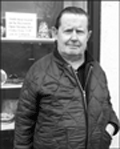Richard Leck — a longtime Villager, poet, verbose observer of daily life and Army veteran — died Dec. 19 at the age of 75.
Leck was born in 1933 in Weehawken, N.J. He lived in the family home in Jersey City until 1976. He was drafted to go to the Korean War in 1951, but deferred his service to attend New York University’s Journalism School. During this time, he also reported for the New Jersey Observer. He served in the Army in peacetime from 1956 to 1958, training at Fort Dix and working in Westchester.
In the 1960s, Leck was a habitué of the Greenwich Village coffeehouse scene, frequenting Cafe Figaro, The Limelight and The Commons, but especially Cafe Feenjon. He mingled inside and outside of the coffeehouses with such figures as Yoko Ono; Shel Silverstein; Peter, Paul, and Mary; Feenjon owner Manny Dworman; poet Taylor Mead; offbeat radio show host Long John Nebel; actor Darren McGavin; and painter Yukiko Katsura, among others.
He said of that time, “I didn’t write in those days — I just listened. I just took it all in.”
He also talked about hanging out in the Village every night and then returning to Jersey City in the wee hours: “I’d stop off at the diner in North Bergen for a cup of coffee and a Danish, and I’d be surrounded by the New Jerseyunderworld. That’s like going from ‘Now, baby, now!’ to ‘Whattdya, kiddin me or somethin’?’”
Leck was a creative soul, who made drawings from his youth through at least the 1960s, studied acting at Stella Adler Studio in the ’80s and began writing poetry in the 1990s.
Leck worked a variety of odd jobs, often retaining a bohemian’s preference for the low-key lifestyle to a regular day job. He did the books for a retailer, he managed an antique store, he sold goods on the street, and he worked with Jewish children. In the 1990s, he worked for several years as a receptionist for the Salmagundi Art Club, and in 1993 (after bouts of homelessness), he moved into the S.R.O. at the Sirovich Senior Center in the East Village. He was still in residence there at the time of his death. In recent years, he was a regular customer at Neptune Diner on First Ave., at St. Mark’s Bookshop and at Junior’s on the Fulton Mall, in Brooklyn.
His first chapbook of poems, “Memory Hair,” was published in fall 2008, and as recently as December he had attended the Indie and Small Press Fair on 44th St. to promote his book. He was working on his memoirs (titled “Jumped, Fell, or Was Pushed”) at the time of his death, co-authoring them with the publisher of his poems, Karen Lillis, of Words Like Kudzu Press. Lillis plans to complete his memoirs, and hopes also to publish a second chapbook of his poetry.
“Though written years earlier, the poems now seem prescient,” Lillis said. “But his style and voice lends a tension; Leck’s narrator speaks as if he were still a child dreaming ahead to the future, while bearing the sometimes-terrible knowledge of a far older self, looking back. In the poems, wonder and tenderness mingle with a quiet acceptance of a weightier reality.”
Leck was buried in a modest military service at Calverton National Cemetery in Suffolk County, Long Island, on Jan. 23. He is survived by his closest friend, Frances Winn.
A memorial reading of Leck’s poems and stories will be held at Bowery Poetry Club in early May, with readers to be announced.


































